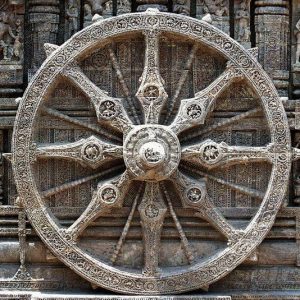Do Buddhists Believe in a Creator God?
Recently I was asked if Buddhists believe in a creator god. Buddhism doesn’t believe in a creator god. Why not?
I was taught in thirteen years of Catholic school that God is all good. God is all powerful. God created everything at a point in time. My thinking at the time was that if that were true then God is very unkind. If all the suffering that we all see and experience were created by him and he could remove it if he wanted to, but he doesn’t, well, only an unkind being would do that.
Buddhist thought makes more sense to me: There is no creator god. We reincarnate again and again and we have done so since beginningless time. Beginningless time is thought to be one of the great mysteries of existence.
So the question arises regarding how things come into existence. Who created our suffering? The answer is that two factors need to come together at the same time: cause and conditions.
Cause refers to the universal law of karma: the law of cause and effect. “What you sow is what you reap.” For example, if we are good moral persons, we will create positive karma and thus create the cause for good things to happen to us. If we are immoral, we create bad karma and thus the cause of suffering. Both good and bad karma accumulate over time until they ripen.
The ripening only happens when all the necessary conditions occur. It is like a plant. Karma is like the seed and the water, soil, sun, fertilizer, etc. are like the conditions necessary for the fruit to grow and ripen.
Karma will ripen in subsequent lives only when the necessary conditions are present or until it is purified through Dharma purification practices. This explains why good things happen to bad people and vice versa.
For example: Say I commit the non-virtue of torturing an animal by damaging its legs. I create the karma that I will have a severe leg injury. Now that doesn’t happen until the conditions arise, like being in a bad car accident.
Everyone is subject to the law of karma. One advantage of this is that it eliminates blame. If someone harms us, we can see that we contributed to this by harming that person previously. It is futile to go through all kinds of pain by resenting and blaming that person who harmed us. We actually created the karma of being harmed. As well, we have actually harmed them because we were the original harmer and are thus the cause for their desire to harm us. Of course, they then have the negative karma of harming us. So the blame lies with us for the original harm.
Blaming the harmer can create generations of feuds and revenge between the two parties and can even expand to include families and nations. This can be seen today in the world. There are countries and races that have been fighting for hundreds of years, continuing the cycle. You may have heard the saying, “An eye for an eye leaves everyone blind.”
So not returning harm becomes important. We can stop the vicious circle by not retaliating. Jesus actually said the same thing when he said, “Turn the other cheek when you are slapped. In this case, Buddhist teaching would agree.
Karma is considered to be a very deep topic that only a very spiritually advanced person understands completely. What I am writing here is only an introduction to the topic.
Regarding suffering, it can be eliminated by developing spiritually and reaching Enlightenment, or Buddhahood. At that point one can truly help others by showing them how to progress. That’s what the historical Buddha did. He was a regular person like us, and he set out to find the truth. He attained Enlightenment and has shown us the way.
Buddha can’t make us enlightened, but he can show us how we can do just like he did by following the various Dharma practices he taught. Enlightenment is possible for us, but we have to do the work. Again, personal responsibility is part of the belief and it can be very empowering as I don’t have to rely on anyone else to be “saved.”
In brief, the path to Enlightenment is a three-fold process:
Listening, Contemplation, Meditation.
First, we need to hear the teaching on how to practice. That’s where gurus (spiritually advanced persons) come in. They are the uphholders of the Buddha’s teachings and they can transmit them to us.
Secondly, we need to think about and deeply contemplate the teaching, thus making sure what it is, but also what it isn’t. We need to clarify any doubts and questions. The guru can help by answering questions.
Then, when we are clear about the topic, we need to meditate on it. This causes the teaching to go deep in us and we can make it truly a part of what we know to be true.
There’s no such thing as blind faith in Buddhism. We don’t need to take another’s word for anything, because we can do the practices and have the experiences directly. Personal experience is much more stable than taking another’s word for something. The Buddha said that he didn’t want us to believe something just because he said it. By doing the spiritual practices we can experience the results for ourselves. After we have had some meditative experience of the result, it becomes easier to continue. At that point our faith becomes based on our own experiece, not the word of someone else. It’s a different kind of faith which is rooted in our own experience.
In any case, I think the question of a creator god is one that we all need to contemplate.
